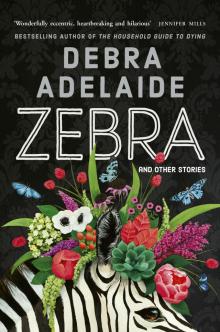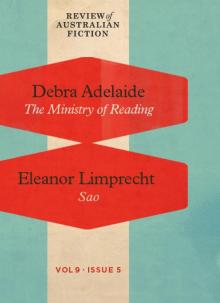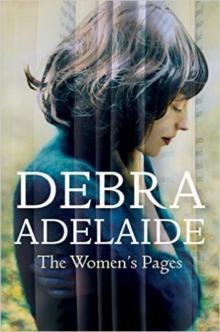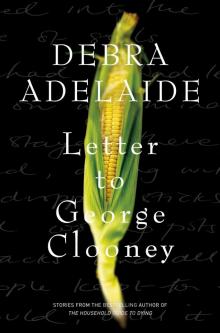- Home
- Debra Adelaide
Zebra
Zebra Read online
About Zebra: And Other Stories
A body buried in a suburban backyard.
A suicide pack worthy of Chekhov.
A love affair born in a bookshop.
The last days of Bennelong.
And a very strange gift for a most unusual Prime Minister . . .
Tantalising, poignant, wry, and just a little fantastical, this subversive collection of short fiction – and one singular novella – from bestselling author Debra Adelaide reminds us what twists of fate may be lurking just beneath the surface of the everyday.
PRAISE FOR DEBRA ADELAIDE
‘Deliciously maverick . . . dazzlingly original’ The Age
‘Comic and ironic . . . while at the same time serious and deeply moving’ Sydney Morning Herald
Contents
FIRST
Dismembering
Welcome to Country
A Fine Day
SECOND
Festive Food for the Whole Family
How to Mend a Broken Heart
Migraine for Beginners
The Master Shavers’ Association of Paradise
THIRD
Carry Your Heart
I am at Home Now
No Hot Drinks in the Ward
Nourishment
The Recovery Position
Wipe Away Your Tears
Zebra
Acknowledgements
For my father, who always loved a joke.
FIRST
Dismembering
The dream was so vivid I woke in a sweat of fear and went straight down the backyard, but the ground between the garden shed and the fence was as innocent as a lamb. Which could also have been grazing there, so green and dewy was the patch. There was no sign the ground had been disturbed in years.
Or perhaps it had, and perhaps I had no idea how quickly lawn could regrow into a smooth carpet. After all, lawn had never been my responsibility. Carpet, yes.
But I still had doubts, and these were so strong that I went inside to the home phone and called my ex-husband. I rarely phoned him from my mobile, on principle. He laughed at me down through the copper cables, after complaining I’d rung him at 6.30 am.
‘You’re sure?’ I said.
‘Of course I’m sure. I think I’d remember a dead body.’ He laughed again, which was so much better than not laughing, or whatever it was he did for the first few years after we parted. I was so pleased to hear this laugh I didn’t mind that it was directed at me.
I stared out the kitchen window towards the shed, trying to remember. Much of the dream was already fading away, as dreams do, but aspects of it were still clear. The cutting off of the head. The removal of the arms and legs. The red checked flannelette shirt it wore. The fact that it was undeniably a man, middle-aged.
What was also clear in the dream was that while my then-husband and I were co-conspirators, it was his action that we were now covering up, though for what reason I could not tell. But somehow I was his assistant, fearful yet compliant. I could see myself in that dream, sawing away at a knee joint with the bush saw and wondering aloud if the tenon saw would do a better job, and that it was a shame we could not use the chainsaw, while he concentrated on digging the hole. But the chainsaw was cinematically clichéd, messy, and far too noisy. The neighbours would be flicking their back lights on: no one used a chainsaw at night.
This hole, when my ex-husband climbed out of it, sprinkled with black soil, turned out to be deep but not quite long enough, hence the careful sectioning of the head and limbs so the pieces could be stacked. Then he said that this would be better anyway, as it would not risk leaving the outline of a regular grave, however faint it might be in years to come. Perhaps we would plant a grevillea or a hybrid ficifolia over the top. At the time I quite liked the cultivar Corymbia ‘Summer Red’.
I went outside again after I had taken the children to school. There was no ficifolia, cultivar or not. There was nothing out there but lawn, recently mown by Sam of Jim’s Mowing, who came twice a month in summer. I trod all over the patch where in my dream I had been arranging arms neatly upon a torso, while my ex-husband leaned on the shovel and wiped a dirty hand across his brow. It was firm. I jumped up and down a few times, then went to the shed and looked inside.
There was the very shovel from my dream, the square-mouth shovel stacked inside the door next to the spade and a few old star posts, which my ex-husband had got when repairing the back fence. He had taken most of the tools and implements, apart from a few, like the shovel and the green spade. I hardly ever used them since discovering – even though my mother had already pointed this out – that a vegetable patch offered little return for hard labour. There was also the Flymo, which Simon and I were both too scared to use (hence Sam, from Jim’s Mowing) and a broken blower vac, which I would never have used anyway.
Anything useful, shed-wise, had been taken out and added to all the other things we had divided up when the split occurred. His Star Wars DVDs. My boxed sets of BBC historical dramas. His gym equipment, dismantled after the first child arrived. Half each of the wedding-present dinner-service cream stoneware, though I kept the gravy boat and sugar bowl. We were gracious about the items we owned together, civilised. He ceded me the blender and espresso machine; I gave him the matching Russell Hobbs toaster and kettle.
While our arguments generally had been spectacular, I could not remember any argument over this final division of possessions, not a single thing, unless I counted the one over the crockpot, of which I was dismissive and contemptuous and he protective, seeing as his older sister had given it as an engagement present. Not that he wanted or ever used it either: it was the principle. Afterwards, I remember taking it to the Salvation Army along with various items, harmless in themselves, but which would only remind me of my failed marriage. Three small framed prints of cacti (anniversary present). A set of satin-edged blankets, new but never used in favour of doonas. A Zyliss mandoline grater (the last anniversary present) with too many attachments to be practical, and indeed requiring a firmer wrist than I had to work properly. A cut-glass vase that only looked good when unoccupied, and in any case was useless for most flowers, excepting those loose bunches of buxom roses that you see in paintings, but which I had never received as a present.
We did not divide the children. We agreed he would keep Corky. My mother helped me with the property, and when that settlement was signed and paid for, the only contact I had with my ex-husband was every other weekend when he would come from Windsor to fetch Oscar and Nancy, waiting on the front porch, stow them and their backpacks into his Prius and return them the next day by 5 pm.
There were these dreams, though. In one of them I was on a train – what is it about trains and dreams? someone must know – and I met him at a country town after a long journey. He was wearing a blue stripey shirt, the sort of shirt that boys the age of three or four wear, and was hiding under the platform bench seat. I leaned down and pulled him out by the hand and he dusted himself off and said, We have to go, come on, I’ve got to get back to work. I’d arrived to help him run some business, but he did not seem all that pleased to see me. Another dream involved a deep, dark swimming pool somewhere, and I was perched on the ladder that vanished into the water’s mysterious depths. Just as I acquired the courage to go deeper he always appeared and hauled me back, away from the water.
These dreams, and others, I re-dreamed over the years, sometimes with variations but not enough to make them more interesting or intelligible. They were just dreams as far as I could see. But if I woke in the morning and these dreams were fresh I would be annoyed. Even in the early days, with Simon beside me, not yet awake, and our new child
ren in their cot at the foot of our bed, I would have these dreams and wonder why, given my new life, my happy life. Had I not moved on? Or did I attribute too much psychological power to such dreams, more than they or he deserved?
But now, there was this new dream.
During that week I couldn’t help myself: I kept walking down the backyard to gaze at that plot of lawn between the garden shed and the fence. I was even thinking of it as a plot, when all it was – all it could possibly be – was an empty space. A stretch of lawn, buffalo grass, or kikuyu. Something I might have turned into another shed, or a pond, or a sandpit for the children, if I had wanted. But its blank innocence mocked me. Why was it so smooth, much smoother, I thought, than the rest of the lawn? And why had the grass there grown so well over the years? Regarded in certain lights, it was distinctly greener.
I started noticing things around the house. The little one-drawer desk in the hall which I had asked my ex-husband to take, several times, but he refused. It had belonged to his side of the family, not mine. I want to travel light, he would say, you hang on to it. The implication being that the life he was leaving had been . . . Well, I don’t need to spell it out.
Then there was the wardrobe in the spare room, now Oscar’s room, which was dark and impractical, and the children complained that it smelled of other people’s clothes, old people’s clothes. Poking my head into the wardrobe and breathing in, I would have to agree, and that something lighter and larger, with wire baskets and maybe those modular white fabric boxes, would be so much better for kids on the verge of teenagehood. But their father disagreed, reminding me that it was valuable, flame mahogany, and that his grandmother had given it to him and not to get rid of it. He did not want it himself, saying he needed very little, that furniture was mostly an encumbrance. You keep them, he’d say with a wave of his hand as he disappeared into his car after returning Oscar and Nancy every other weekend. He somehow managed me into being responsible for his belongings while at the same time making me feel I was a shallow materialist nailed down by things; his life, meanwhile, was now free and floating. When I thought it through I became enraged. Wasn’t he the one with a huge place out there at Windsor, with plenty of room in the house for old wardrobes?
Enough of this, I thought. I would get tough. That weekend was when he was due to take the children. I put the hallway desk onto the front porch and then, when Simon came home from work on the Friday night, we dragged the ugly old people–smelling wardrobe out beside it. This time I texted my ex-husband, suggesting he might need to hire a utility instead of coming in the Prius. I almost never texted him, since messages tended to provoke responses. I found the old landline so much simpler for post-post-nuptial negotiations. There was also the undeniable satisfaction of real hanging up: no matter how hard one jabbed an end button with one’s thumb, it was no substitute for crashing a receiver down.
Simon, the twins, and I went away for that weekend too, returning on the Sunday afternoon to find a sullen Oscar and Nancy sitting on the desk with the wardrobe standing guard.
The next day I noticed a stack of prints against the wall in the spare room. Norman Lindsays, unframed. How had they escaped our divvying-up years back? I had always hated the goggle-eyed, preposterously breasted female figures that Lindsay sketched. You would not catch me hanging them in my house. There was also the roll of posters that represented my ex-husband’s brief period as a student activist. I packed them onto the desk on the front porch then went back inside the house. A room-by-room search was required. The rest of the spare room, the space under our king bed, the top of the children’s toy closet, the laundry, right through to the cupboard on the back verandah: they all yielded tarnished marriage spoils that each of us had overlooked all those years back, and which I certainly did not want, perhaps never had. A stack of LP records which contained such eccentric artists I knew they could never have been mine, including a radiator coolant–green vinyl actually called The World’s Worst Record. A three-piece EPNS coffee set (cricket prize? company farewell gift?) nestled in purple satin in a fake velvet box. A black wooden photo frame still in its plastic wrapping, containing a trio of oval shapes, ones that would never be filled. A nest of laminex tables, small, medium and large. Why was everything in threes? As if the drama of marriage were in three acts. Well, this was the coda, the encore, the next play.
We were lucky, the house was large, but even so I could not understand how these items had escaped my scrutiny all those years back. Now I regarded them with new and uncompromising eyes, eyes that had seen strange things, albeit in a dream. A monkey-pod salad bowl and servers I found in the dining room dresser, not mine and never used. What was monkey pod anyway – was that even a real type of tree? More prints from the days he fancied collecting botanical ephemera. Butterflies pinned and framed in little glass boxes. Magnificent butterflies. I did not gaze at them too long. It would perhaps inspire metaphor, and I had no need of metaphor, being on such a practical mission.
I dragged everything out to the front porch and stacked it as neatly as I could and, when I was done, went around inside and outside once again, just to be sure. I added a garden rake that I remember him buying back when Bunnings was Hardware House and raking the lawn an altogether different activity, somehow homely and bonding. Now the job never invoked images of autumnal joy: Corky chasing flurrying leaves, silly wheelbarrow rides, red cheeks and post-gardening beers. Perhaps it never had. Perhaps I was remembering a storybook marriage, the Ladybird book cover one, and not the one that really existed? Anyway, after the rake, all that was left was the shed down the back. Before doing that I texted him. He didn’t respond within five minutes so I rang, intending to leave a voicemail, but he actually answered.
I told him what I had done and where he would find everything. A couple of old coats from the hall cupboard, and the rolled-up, supposedly Persian rug from the garage. His kayak, which I’d found lying forgotten beside the fence, covered in morning glory. The box of broken medicine bottles, doubtless old, possibly antique, but broken all the same.
‘You’ve told me not to enter the house. It’s why I wait in the driveway to pick up the kids.’
‘I’m making an exception.’
‘I think this is your problem, not mine.’
‘Including that dead body in the backyard,’ I said.
But he had already hung up.
I inspected the garden shed dispassionately. He had taken his toolbox with the good saw, screwdriver set and assorted fixings. Also the whipper snipper, chainsaw and hedge trimmer, along with the smaller electrical tools: the orbital sander, belt sander, angle grinder, and the good cordless drill. He had left the bad cordless drill but I didn’t mind because it was fine for small jobs around the house. The shed had never been my domain but I had always prided myself on keeping it neat. Now dead leaves littered the ground and dust covered everything. The potato vine on the back fence had sneaked its way inside and cobwebs obscured the window, danced from the naked light fitting, and covered a precarious stack of milk crates. Amongst sagging cardboard boxes and scraps of old towels and paint-splattered sheets there was very little that could be considered functional. A grease-black vice was still clamped to the bench, never used as far as I remembered. The naked outlines of shapes on the hand-tool wall looked both sinister and forlorn, as if a forensic team had done its job then quickly moved on.
Over the years I had become accustomed to simply reaching in for whatever garden implement I needed then putting it back beside the door. I had long promoted the bad cordless drill, the rusty but serviceable claw hammer, and a handy little screwdriver set to the laundry, for ease of use. I switched off the light that did not work, and struggled with the bolt that barely slid. If I looked at this sad, broken-down place any longer I would start to see metaphor.
Busy for the next few days with the twins’ birthday party and the older kids’ end-of-term school play, I handwrote invitations and tic
ked names off lists, and attended meetings to determine the craft roster. I shopped and cleaned and cooked. I iced cupcakes and fashioned real sausage rolls. Using empty pineapple juice tins, I baked the chocolate cake for a spectacular medieval castle. The twins had stipulated turrets, drawbridge and a moat. I knew I could do a lot with chocolate icing but was still not sure about the moat. Then I stuffed octopus arms and sewed them onto a leotard. I spent hours on my knees with the good scissors cutting blue and purple satin into shapes to pass on to the next mother in the process line, I think for stitching into enormous padded bubbles. So it was a few days before I had time to ring again. The items on the front porch, and now the front path, were depressing me, and, besides, I didn’t want the clutter when all those parents were coming by on Saturday to drop off Miles and Ricky’s friends. I told him I didn’t care that it was not his designated weekend, I wanted the lot gone.
‘And another thing,’ I said. ‘Don’t forget that dead body of yours in the backyard.’
‘There’s no dead body.’
‘Yes, there is.’
‘No, there isn’t, Genevieve.’
Then he hung up. Bastard. He knew how much I hated anything but Gen.
To be honest, I hadn’t wanted Corky at the time. She had diabetes and he had suggested that living with him would be easier. There was also the advantage of the vast freedom of his new place. And it would provide some continuity for the children, who were only little, for their weekend stays. We had both agreed on that.
But I wanted Corky now. In fact just thinking about her made me feel almost bereft, which was strange so many years later. She would be nine or ten by now. I began to imagine he was not looking after her properly, not feeding her high-protein kibble, and failing to administer her daily injections of insulin. Had he kept her vaccinations up to date? Remembered to inspect her ears? Perhaps she would succumb to a tick out there on that property, which, I was told, included a large stretch of unimproved ground. I was always reminding the children of the hazards of this. But I did not feel I could interrogate them about Corky, and aside from my bland questions about how she was doing, and their bland answers that she was great or okay or slept a lot or hardly ever dug holes now (probably because the place was intimidatingly huge), I felt uncomfortable about probing.

 Zebra
Zebra Review of Australian Fiction, Volume 9, Issue 5
Review of Australian Fiction, Volume 9, Issue 5 The Women's Pages
The Women's Pages Letter to George Clooney
Letter to George Clooney